Author: Lisa
Editor: Liz
Background
In April 2025, the United Nations Office on Drugs and Crime (UNODC) released a report titled "The Global Impact of Southeast Asia's Scam Centers, Underground Banks, and Illegal Online Markets" [1]. The report systematically analyzes the emerging forms of transnational organized crime in Southeast Asia, particularly focusing on a new digital crime ecology centered around online scam centers, which integrate underground banking money laundering networks and illegal online market platforms.
Shortly after the report was published, the U.S. Department of the Treasury [2] announced sanctions on the Karen National Army (KNA) and its leaders and relatives on May 5, 2025, designating it as a significant transnational criminal organization involved in online scams, human trafficking, and cross-border money laundering activities. The border area controlled by the KNA has become a gathering place for multiple scam groups, and its collusion with the Myanmar military allows it to lease land on a large scale, provide power supply and security services, supporting the daily operations of scam parks. On May 1, 2025, the Financial Crimes Enforcement Network [3] also listed Huione Group as a major money laundering concern, identifying it as a key channel for North Korean hacker organizations and Southeast Asian scam groups to launder proceeds from virtual asset crimes, involving various types of investment scams such as "pig butchering."
The report points out that as the synthetic drug market in Southeast Asia becomes saturated, criminal groups are rapidly transforming, using scams, money laundering, data trading, and human trafficking as profit-making means, and constructing a cross-border, high-frequency, low-cost black market system through online gambling, virtual asset service providers, Telegram underground markets, and cryptocurrency payment networks. This trend initially erupted in the Mekong subregion (Myanmar, Laos, Cambodia) and quickly spread to weakly regulated areas in South Asia, Africa, and Latin America, forming a clear "gray export."
UNODC warns that this type of crime model has developed highly systematic, specialized, and global characteristics, continuously evolving with emerging technologies, and has become a significant blind spot in international security governance. In the face of the ongoing threat, the report calls on governments to immediately strengthen regulation of virtual assets and illegal financial channels, promote on-chain intelligence sharing and cross-border cooperation mechanisms among law enforcement agencies, and establish a more efficient anti-money laundering and anti-fraud governance system to curb this rapidly developing global security risk.
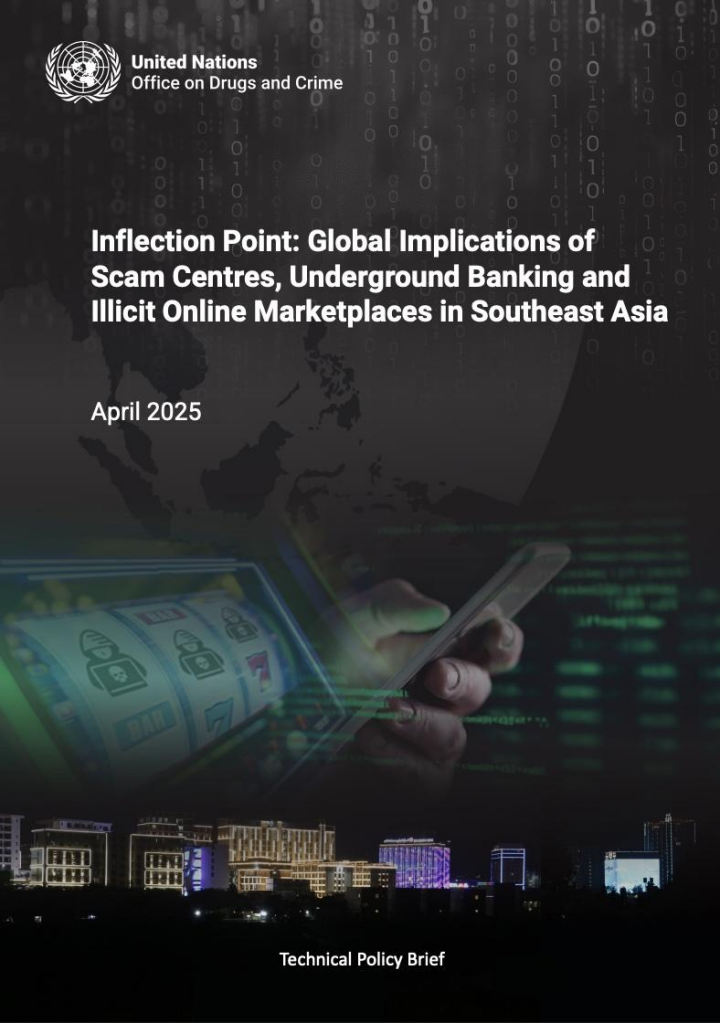
This article will analyze from the following four dimensions: the criminal ecosystem in Southeast Asia, global expansion beyond Southeast Asia, emerging illegal online markets and money laundering services, and transnational criminal networks and global law enforcement cooperation.
Southeast Asia Gradually Becoming the Core of the Criminal Ecosystem
With the rapid expansion of the Southeast Asian cybercrime industry, the region is gradually evolving into a key hub of the global criminal ecosystem. Criminal groups exploit the region's weak governance, convenient cross-border cooperation, and technological loopholes to establish highly organized and industrialized crime networks. From Myawaddy in Myanmar to Sihanoukville in Cambodia, scam centers are not only large in scale but also continuously evolving, employing the latest technologies to evade crackdowns and obtaining cheap labor through human trafficking.
High Mobility and Adaptability Coexist
Southeast Asian cybercrime groups exhibit high mobility and strong adaptability, able to quickly adjust their activity locations based on law enforcement pressure, political situations, or geopolitical conditions. For example, after Cambodia cracked down on online gambling, many scam groups moved to special economic zones in Myanmar's Shan State and Laos' Golden Triangle, and later migrated again to the Philippines and Indonesia due to the turmoil in Myanmar and regional joint law enforcement, forming a cyclical trend of "crackdown—relocation—return." These groups disguise themselves using casinos, border economic special zones, and resorts, while also "sinking" into more remote, law enforcement-weak rural areas and border regions to evade concentrated crackdowns. Additionally, their organizational structure is increasingly "cellular," with scam points dispersed into residential buildings, guesthouses, and even outsourced companies, demonstrating strong survival resilience and redeployment capabilities.
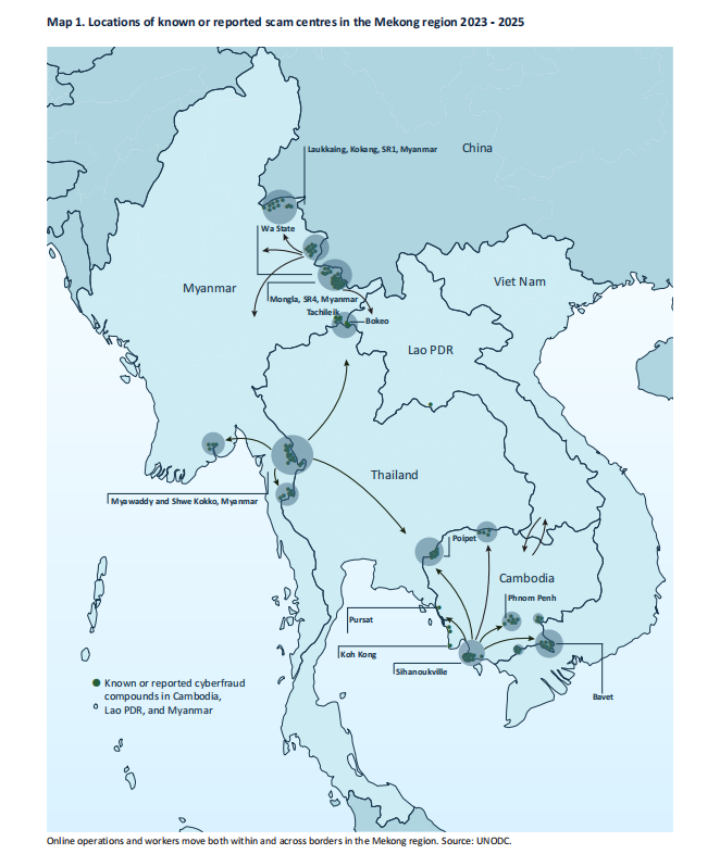
Systematic Evolution of the Scam Industry Chain
Scam groups are no longer loose associations but have established a "vertically integrated criminal industry chain" from data collection, scam execution to money laundering and cashing out. The upstream relies on platforms like Telegram to obtain global victim data; the midstream implements scams through methods such as "pig butchering," "fake law enforcement," and "investment inducement"; the downstream relies on underground banks, OTC trading, and stablecoin payments (like USDT) to complete fund laundering and cross-border transfers. According to UNODC data, in 2023, cryptocurrency scams caused economic losses exceeding $5.6 billion in the U.S., with an estimated $4.4 billion attributed to the so-called "pig butchering" scams most prevalent in Southeast Asia. The scale of scam profits has reached "industrial level," forming a stable profit loop that attracts more and more transnational criminal forces to participate.
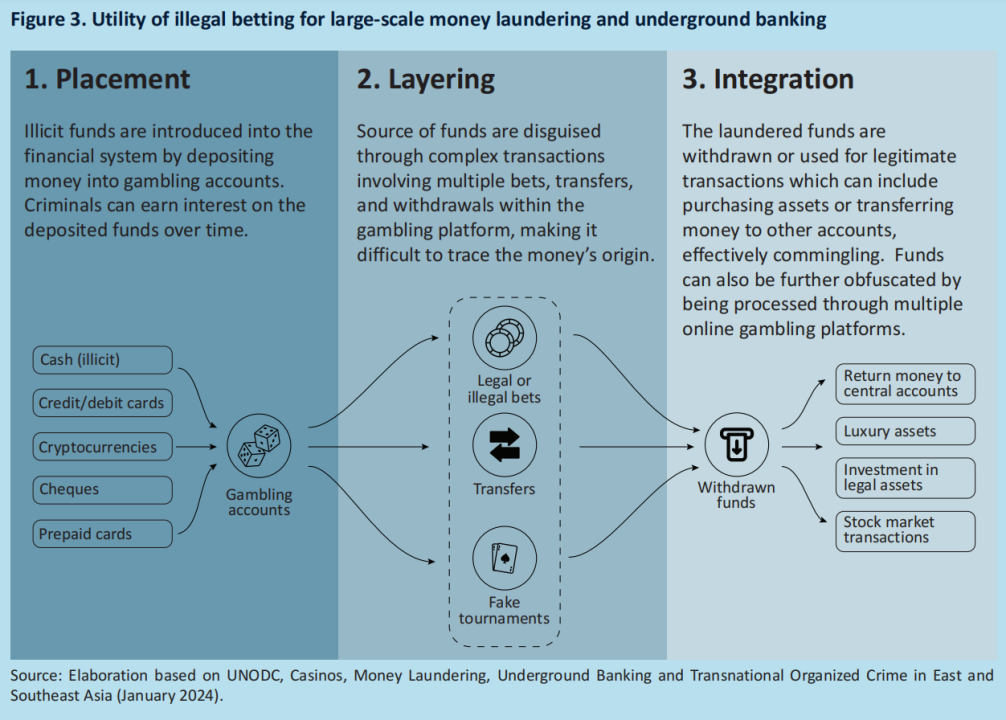
Human Trafficking and Labor Black Market
The expansion of the scam industry is accompanied by systematic human trafficking and forced labor. The personnel in scam parks come from over 50 countries worldwide, particularly young people from China, Vietnam, India, and Africa, who are often lured into the country by false recruitment for "high-paying customer service" or "technical positions," only to have their passports confiscated, suffer violent control, or even be resold multiple times. In early 2025, over a thousand foreign victims were repatriated from Myanmar's Karen State in a single operation. This "scam economy + modern slavery" model is no longer an isolated phenomenon but a human support method that runs through the entire industry chain, leading to severe humanitarian crises and diplomatic challenges.

Digitalization and Continuous Evolution of Criminal Technology Ecology
Scam groups possess strong technical adaptability, continuously upgrading their counter-surveillance methods and constructing a "technologically independent + information black box" crime ecology. On one hand, they commonly deploy infrastructure such as Starlink satellite communications, private power grids, and intranet systems to detach from local communication control, achieving "offline survival"; on the other hand, they extensively use encrypted communication (such as end-to-end encrypted Telegram groups), AI-generated content (Deepfake, virtual anchors), and automated phishing scripts to enhance scam efficiency and disguise. Some organizations have even launched "Scam-as-a-Service" platforms, providing technical templates and data support to other groups, promoting the productization and servitization of criminal activities. This continuously evolving technology-driven model is significantly undermining the effectiveness of traditional law enforcement methods.
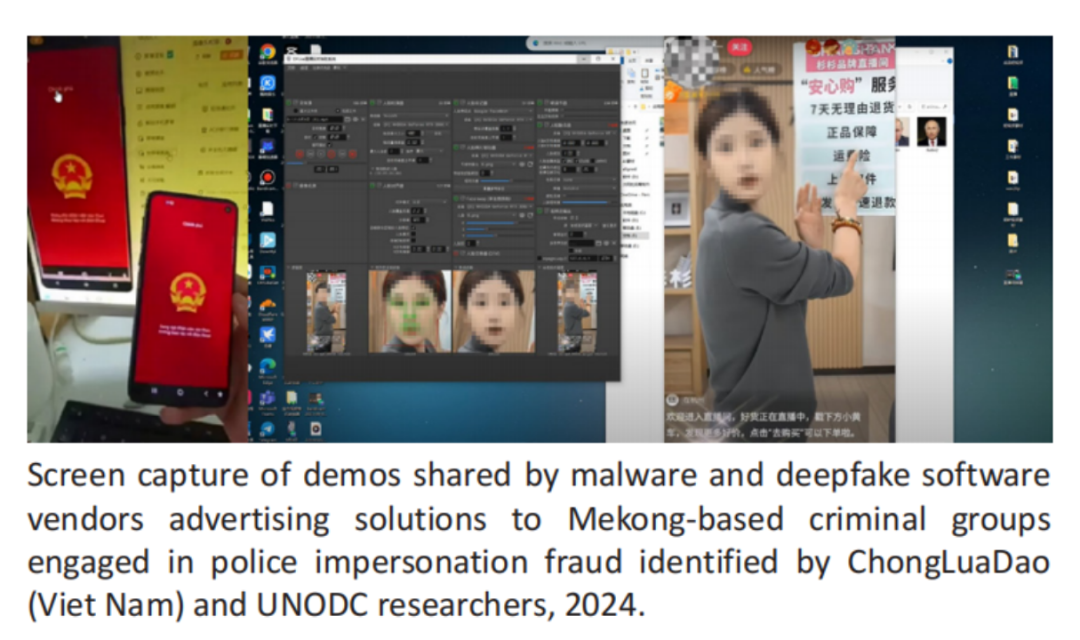
Global Expansion Beyond Southeast Asia
Southeast Asian criminal groups are no longer limited to local operations but are expanding globally, establishing new operational bases in other parts of Asia, Africa, South America, the Middle East, and even Europe. This expansion not only increases the difficulty of law enforcement but also makes scams, money laundering, and other criminal activities more internationalized. Criminal groups exploit local regulatory loopholes, corruption issues, and weaknesses in financial systems to rapidly penetrate new markets.
Asia
Taiwan: Has become a center for scam technology development, with some criminal groups establishing "white label" gambling software companies in Taiwan to provide technical support for Southeast Asian scam centers.
Hong Kong and Macau: Underground banking hubs that assist in cross-border capital flows, with some casino intermediaries involved in money laundering (e.g., the Sun City Group case).
Japan: In 2024, online scam losses increased by 50%, with some cases involving Southeast Asian scam centers.
South Korea: A surge in cryptocurrency scams, with criminal groups using KRW-pegged stablecoins to launder money.
India: Citizens are trafficked to scam centers in Myanmar and Cambodia, with the Indian government rescuing over 550 people in 2025.
Pakistan and Bangladesh: Become sources of scam labor, with some victims lured to Dubai and then resold to Southeast Asia.
Africa
Nigeria: Nigeria has become an important destination for the diversification of Asian scam networks into Africa. In 2024, Nigeria dismantled a large scam group, arresting 148 Chinese citizens and 40 Filipinos involved in cryptocurrency scams.
Zambia: In April 2024, Zambia dismantled a scam group, arresting 77 suspects, including 22 Chinese scam leaders, who were sentenced to up to 11 years in prison.
Angola: At the end of 2024, Angola conducted a large-scale raid, detaining dozens of Chinese citizens suspected of involvement in online gambling, scams, and cybercrime.
South America
Brazil: In 2025, the "Online Gambling Legalization Act" was passed, but criminal groups still use unregulated platforms for money laundering.
Peru: Dismantled a Taiwanese criminal group known as the "Red Dragon Group," rescuing over 40 Malaysian workers.
Mexico: Drug trafficking groups launder money through Asian underground banks, charging low commissions of 0% - 6% to attract customers.
Middle East
Dubai: Has become a global money laundering center. The main perpetrator of a $3 billion money laundering case in Singapore purchased luxury homes in Dubai, using shell companies to transfer funds. Scam groups have set up "recruitment centers" in Dubai to lure laborers to Southeast Asia.
Turkey: Some Chinese scam leaders obtain Turkish passports through investment citizenship programs to evade international warrants.
Europe
United Kingdom: London real estate has become a tool for money laundering, with some funds originating from Southeast Asian scam profits.
Georgia: The city of Batumi has seen the emergence of a "Little Southeast Asia" scam center, with criminal groups using casinos and football clubs for money laundering.
Emerging Illegal Online Markets and Money Laundering Services
As traditional criminal methods face crackdowns, Southeast Asian criminal groups are turning to more covert and efficient illegal online markets and money laundering services. These emerging platforms generally integrate cryptocurrency services, anonymous payment tools, and underground banking systems, providing criminal entities such as scam groups, human traffickers, and drug dealers with fraud toolkits, stolen data, and AI deepfake software. They also enable rapid fund flows through cryptocurrencies, underground banks, and Telegram black markets, posing unprecedented challenges to global law enforcement agencies.
Telegram Black Market
The range of services offered by criminals on numerous Telegram-based illegal online markets and forums in Southeast Asia is increasingly globalized. In contrast, the dark web requires a certain level of technical expertise, lacks real-time interaction, and has a higher technical threshold; Telegram, however, is easily accessible, mobile-first in design, has strong encryption features, instant messaging capabilities, and automated operations through bots, making it easier for Southeast Asian criminals to implement scams and scale their activities.
In recent years, some of the most powerful and influential criminal networks in the region have controlled multiple Telegram-based platforms, which have become the main venues for local criminals and service providers to gather, connect, and conduct business. These illegal markets are often linked to cryptocurrency exchanges controlled by the same organization, gathering numerous merchants specializing in selling stolen data, hacking tools, malware, and various underground banking, money laundering, and cybercrime services, while other criminals—especially those engaged in online scams—profit from these services.
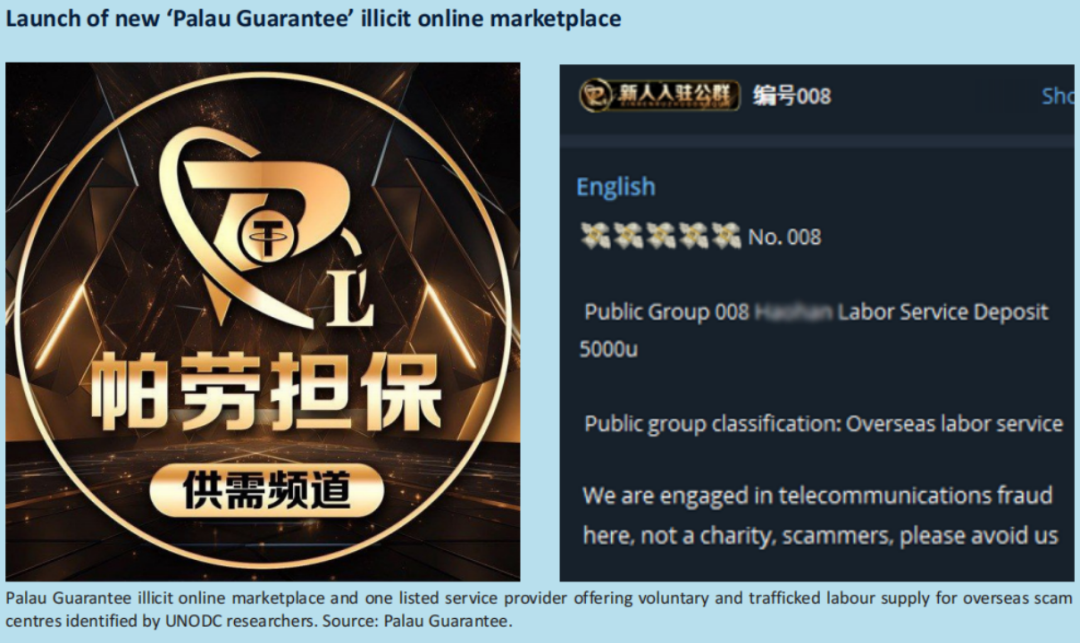
Fully Light Guarantee
Fully Light Guarantee, as an early prototype platform of illegal markets in Southeast Asia, was founded and operated by the Liu family, controlled by the Kokang Border Guard, in Shan State, Myanmar, attracting over 350,000 users at its peak. This platform not only serves the scam centers in the Kokang and Myawaddy regions but also acts as a trading market for human trafficking, recruitment intermediaries, informal cross-border money laundering, and "black industry" technical support. Its operations rely on hundreds of public and private groups, covering the entire chain from basic tool supply to fund laundering.
Although the Kokang Border Guard was overthrown in 2024, a large number of emerging markets supported by other criminal groups, adopting similar "guarantee systems," have emerged in the region before and after its capture. These new platforms quickly absorbed resources from the crackdown and continue to expand and evolve, posing ongoing threats to the integrity of the financial system, regional stability, and international security.
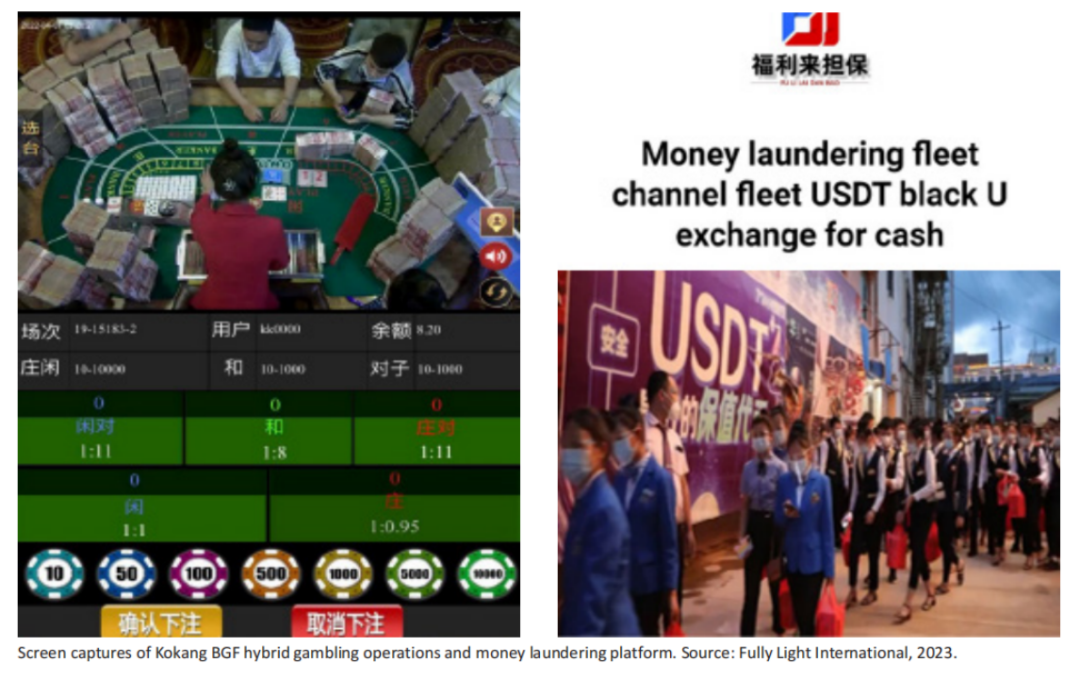
Huione Guarantee
Over the past year, Huione Guarantee has become one of the largest illegal online trading markets in terms of global users and transaction volume, serving as a key infrastructure for the expansion of the Southeast Asian online scam ecosystem. Headquartered in Phnom Penh, Cambodia, primarily in Chinese, the platform has surpassed 970,000 users and has thousands of interconnected suppliers as of the writing of this article. The company is associated with subsidiaries registered in countries/regions such as Canada, Poland, Hong Kong, and Singapore, and holds currently valid trademarks in the U.S. and other countries/regions.
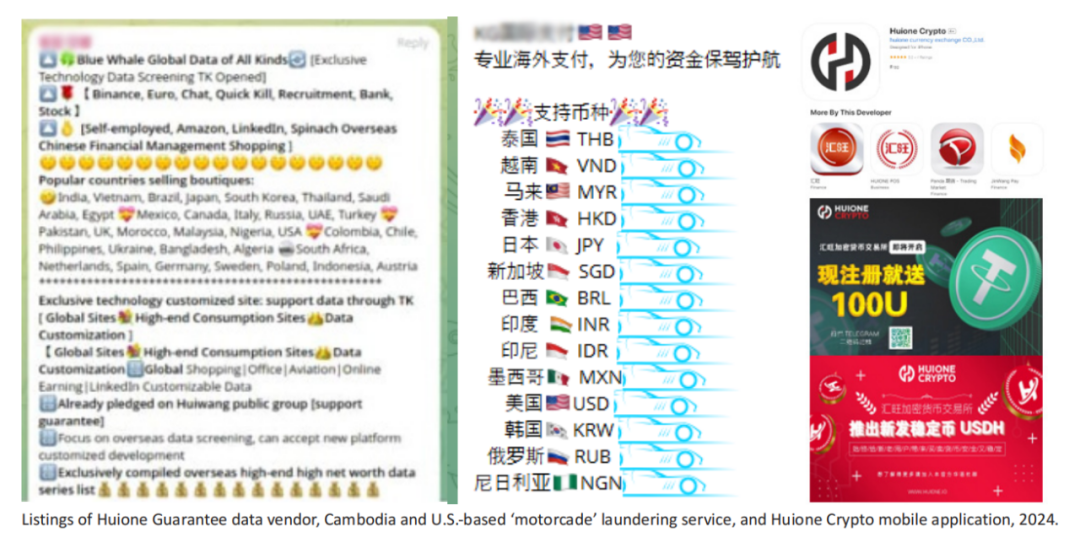
Since 2021, Huione Guarantee has processed hundreds of billions of dollars in cryptocurrency transactions. On-chain analysis shows that the platform has become a one-stop service center for criminals to obtain the technology, infrastructure, data, and other resources needed for online scams, cybercrime, large-scale money laundering, and evading sanctions. Some experts estimate that the cryptocurrency wallets used by Huione Guarantee and its suppliers have received inflows of at least $24 billion over the past four years. Law enforcement agencies and blockchain researchers report a clear connection between this market and criminal groups targeting global victims.
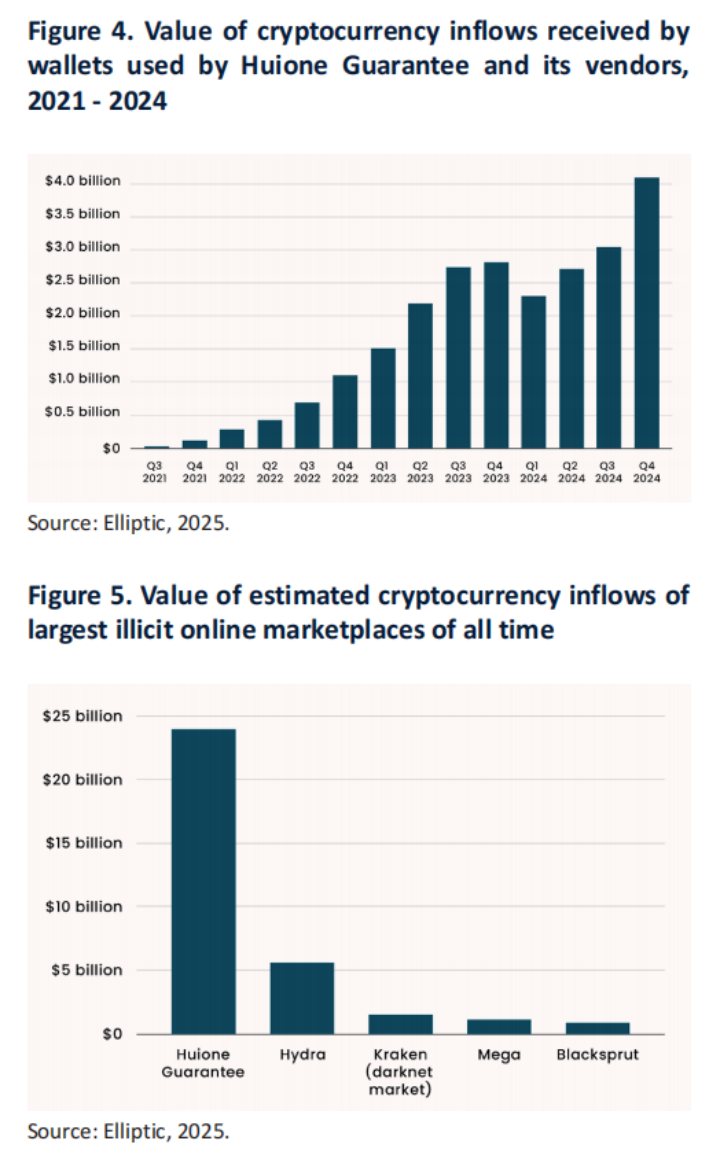
Huione has also launched a series of its own cryptocurrency-related products, including a cryptocurrency exchange, a crypto-integrated online gambling platform, the Xone Chain blockchain network, and its self-issued USD-backed stablecoin. This stablecoin claims to be "not subject to traditional regulatory restrictions," aiming to "avoid common freezing and transfer restrictions of traditional digital currencies." In February 2025, the group announced the launch of the Huione Visa card and revealed that it is heavily investing in other large illegal online markets, social media, and messaging platforms, as well as specialized money laundering services, including acquiring a 30% stake in Tudao Guarantee in December 2024. This series of actions highlights that Huione may be preparing to hedge against future restrictions imposed by mainstream platforms.
Huione and Fully Light not only share some platform design and operational personnel but also reflect a replicable illegal business model—centered on platform-based guarantees, transforming traditional black market transactions into "fintech" and "cross-border corporatization," forming an underground network economic system based in Southeast Asia and radiating globally. As countries strengthen regulation and enforcement, such platforms are showing trends of relocating overseas, diversifying financial products, and smartening technological tools, severely disrupting the transparency of on-chain transactions and eroding the trust foundation of the global crypto asset ecosystem.
Transnational Criminal Networks and Global Law Enforcement Cooperation
In Southeast Asia, some transnational criminal groups use complex business structures to conceal illegal activities, particularly in money laundering and online scams. For example, a multi-billion dollar money laundering case that broke out in Singapore in 2023 revealed a large, cross-border organized crime network relying on multiple nationalities and cryptocurrency assets. Most suspects in the case were born in China but obtained multiple national passports through investment citizenship programs in countries such as Cambodia, Cyprus, and Turkey, widely establishing companies, bank accounts, and high-value real estate in Southeast Asia and overseas to conceal illegal proceeds from telecom fraud, illegal online gambling, and more. By flexibly combining on-chain transactions, stablecoin payments, and offshore accounts, this criminal network was able to "island-hop" funds between different regulatory systems, greatly increasing the difficulty of transnational financial regulation and criminal investigation tracing.
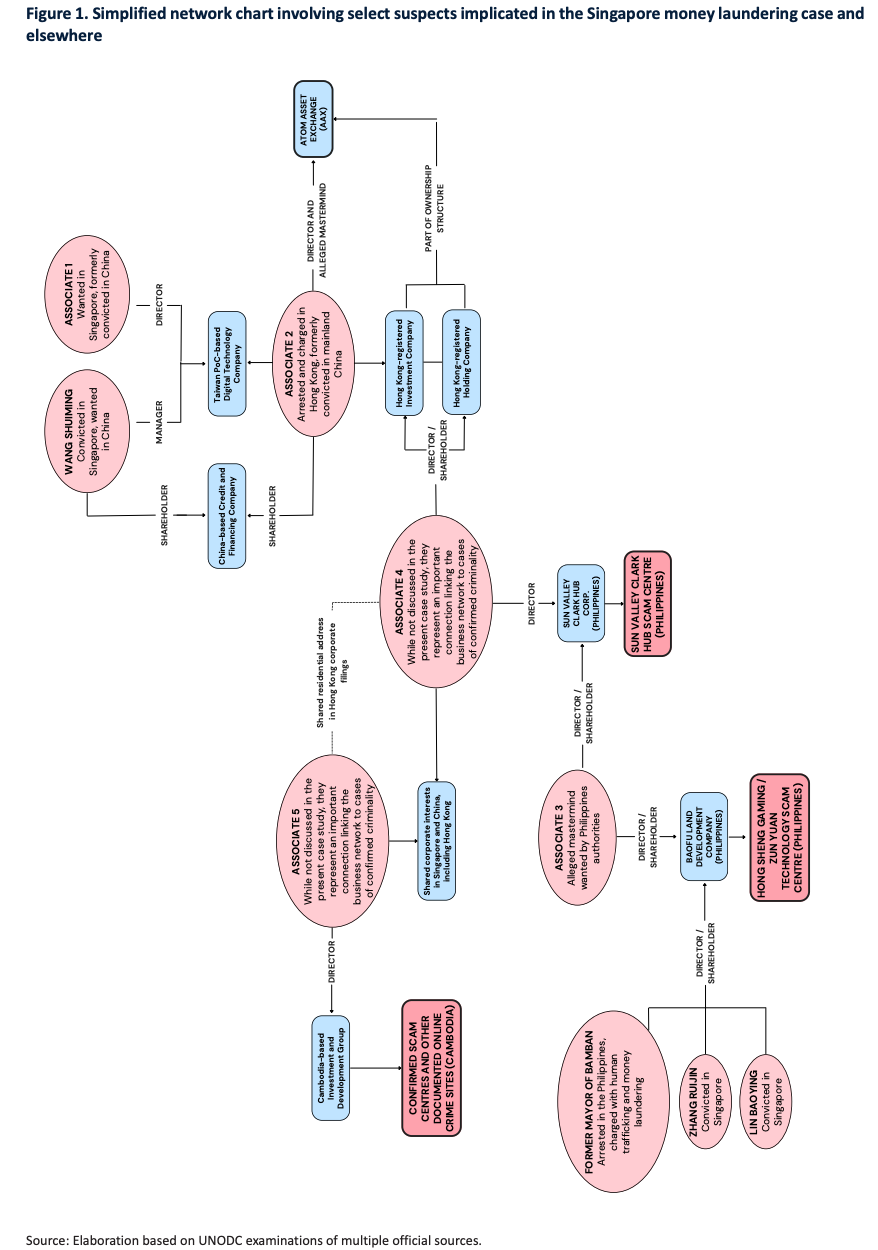
The case further revealed direct connections between the gang and multiple Southeast Asian scam centers and defunct Hong Kong cryptocurrency exchanges (such as AAX), with their fund flow trajectories extending to scam parks in the Clark Freeport Zone in the Philippines, casinos in Cambodia, shell companies established in Taiwan, and even related assets within Canada. Some suspects were also involved in human trafficking and forced labor, with their illegal profits laundered through false income statements, forged documents, and multiple underground stablecoin channels. Under the enforcement push in the Philippines and Hong Kong, several high-ranking executives involved in the case were arrested and assets frozen in 2024, marking the initial success of international cooperation in this case. However, some core fugitives still escaped using private jets and multiple passports, highlighting the deep-seated challenges of current cross-border law enforcement in terms of technology and systems.
This case is a microcosm of the ongoing reconstruction of the illegal online economy landscape in Southeast Asia. The aforementioned platforms, Huione Guarantee and Fully Light Guarantee, are key pivot points in building the "infrastructure" for such cross-border financial crimes. While providing guarantee services, they effectively act as "industry intermediaries" for criminal activities such as scams, gambling, money laundering, and human trafficking, offering integrated services from tools, accounts, and transaction matching to fund laundering for transnational organizations like BG 2 (Mekong Crime Group). BG 2 further expands its criminal network to places like Georgia by establishing legitimate business fronts, investing in real estate and sports clubs to "clean" illegal income, successfully replicating the operational model of the Southeast Asian scam industry chain.
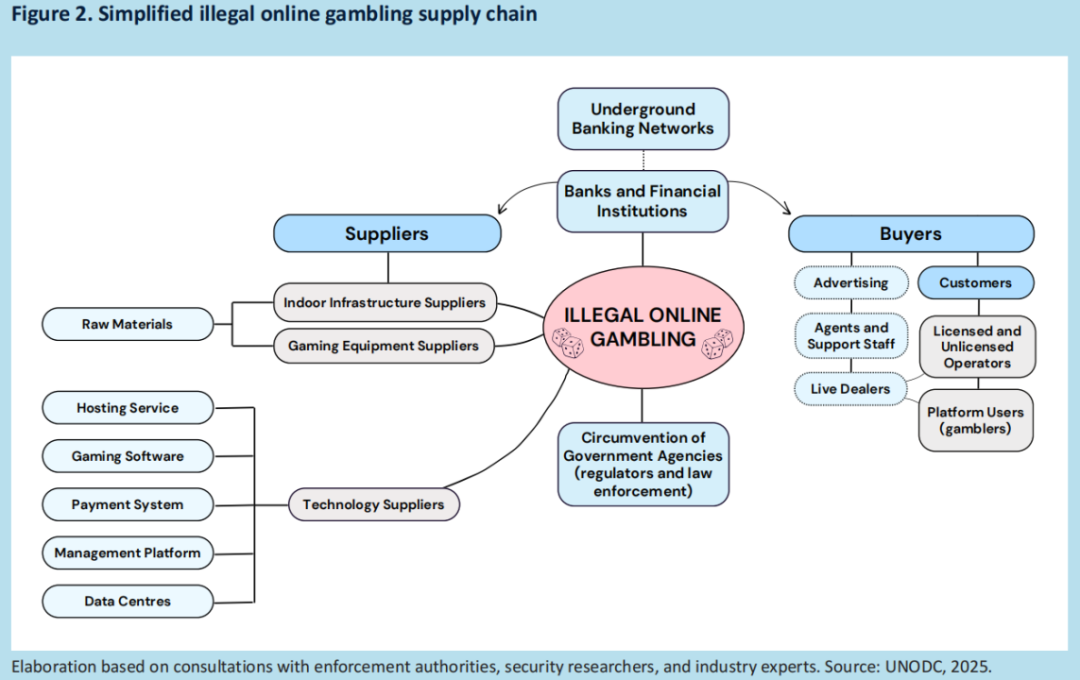
On one hand, these organizations leverage multiple national identities, complex shell company structures, and on-chain payment methods to navigate between different jurisdictions, creating a de facto "law enforcement black hole"; on the other hand, due to lengthy judicial assistance procedures, strong anonymity of crypto assets, and the global distribution of victims, law enforcement in various countries struggles to form an efficient joint strike mechanism. Although countries like Singapore and the Philippines have begun to strengthen anti-money laundering mechanisms, freeze on-chain assets, and initiate international wanted notices, relying on isolated actions is still far from sufficient in the face of an increasingly fintech-oriented black network economy centered in Southeast Asia.
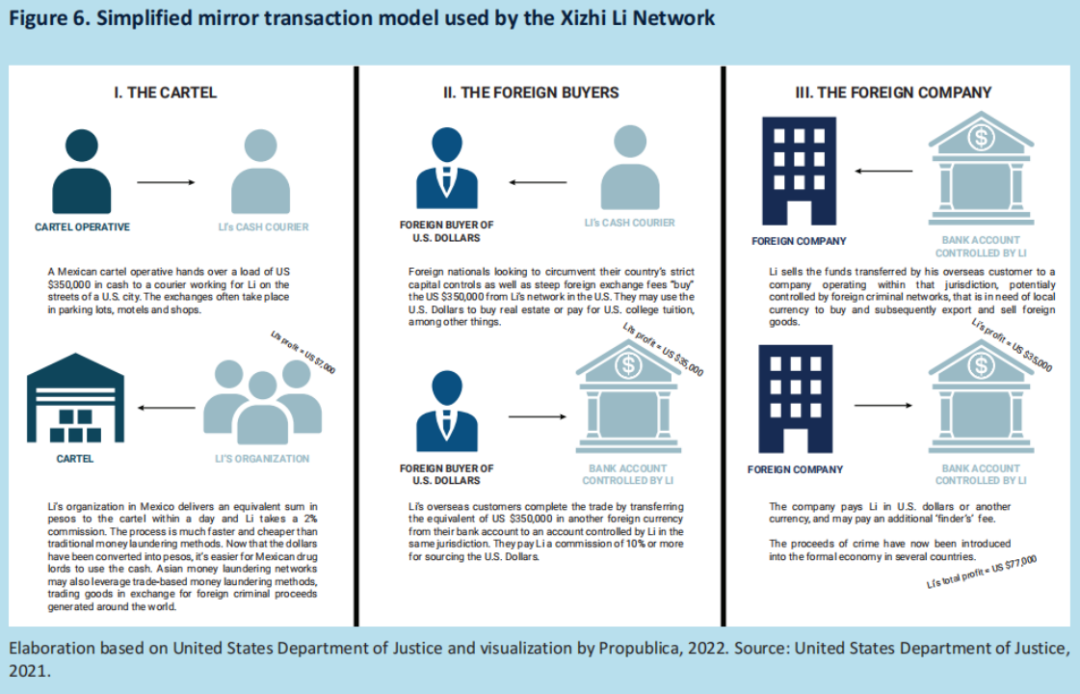
To curb such transnational organized crypto crimes, efforts need to focus on the following aspects to promote international cooperation and the establishment of on-chain governance systems:
- Promote global unification of anti-money laundering (KYC) standards for crypto assets;
- Strengthen cross-border asset freezing and criminal tracing cooperation based on blockchain intelligence and judicial assistance agreements;
- Establish multilateral mechanisms to sanction "high-risk platforms" and "criminal guarantee markets" providing illegal services;
- Enhance tactical cooperation between law enforcement agencies and on-chain monitoring companies and exchanges to compress the space for illegal fund flows.
Conclusion and Recommendations
- Raise Awareness and Understanding: High-level government involvement is crucial for enhancing awareness of scam centers and related crimes. There is a need to improve understanding of risks associated with online scams, underground banks, and to strengthen anti-corruption measures.
- Strengthen Regulatory Framework: Regular reviews and reforms of existing legal frameworks are necessary, especially regarding regulations on money laundering, virtual assets, special economic zones, and online gambling. Improve oversight mechanisms to monitor fund flows in high-risk industries and strengthen legal provisions for asset recovery and victim protection.
- Enhance the Technical and Operational Capacity of Law Enforcement Agencies: Develop monitoring and investigative technologies, collect and analyze digital evidence, strengthen transnational cooperation, and enhance judicial fairness. Improve law enforcement effectiveness through professional training and inter-agency collaboration.
- Promote Overall Government Response and Inter-Agency Coordination: Establish national coordination mechanisms to facilitate cooperation among ministries and law enforcement agencies, and strengthen the identification and protection of victims of forced crimes. Enhance border management oversight to ensure cross-border action against criminal activities.
- Advance Pragmatic and Effective Regional Cooperation: Strengthen cross-border collaboration, share information in a timely manner, and coordinate actions. Support joint investigations through regional platforms, implement risk-based response measures, and enhance multilateral cooperation.
These recommendations will help Southeast Asian countries address the key governance shortcomings identified in the report, enhance the awareness and response capabilities of governments, regulatory agencies, and law enforcement departments, thereby promoting regional security cooperation and combating transnational organized crime.
Conclusion
The analysis of the UNODC report indicates that Southeast Asia has become a hub for global cybercrime and illegal financial activities, and this trend is continuously expanding globally. In the face of this transnational crime threat, governments, regulatory agencies, and law enforcement bodies must strengthen collaboration to build a more efficient international anti-money laundering and anti-fraud governance system. Especially against the backdrop of increasing misuse of virtual assets and cryptocurrencies for money laundering and scams, global information sharing and technological collaboration will be key pathways to curbing related crimes. Only through comprehensive and multi-layered international cooperation can we effectively address the increasingly complex global cybercrime issues and safeguard the security of the global financial system and social stability.
Related Links
[1]https://www.unodc.org/roseap/uploads/documents/Publications/2025/Inflection_Point_2025.pdf
[2]https://home.treasury.gov/news/press-releases/sb0129
[3]https://www.fincen.gov/news/news-releases/fincen-finds-cambodia-based-huione-group-be-primary-money-laundering-concern
免责声明:本文章仅代表作者个人观点,不代表本平台的立场和观点。本文章仅供信息分享,不构成对任何人的任何投资建议。用户与作者之间的任何争议,与本平台无关。如网页中刊载的文章或图片涉及侵权,请提供相关的权利证明和身份证明发送邮件到support@aicoin.com,本平台相关工作人员将会进行核查。



